频度副词讲解与练习
八年级英语上册---频度副词语法讲解与专项练习

频度副词专项训练
( B )1. My father usually ____ to work.A. driveB.
drives C. drove D. is driving
( A )2. —____ do yougo to the movies?—Hardly ever.A.
词位于否定词之前或之后均可,而有的频度副词则必须位 于否定词之后,而还有的频O度92副词却必须要位于否定词。
大致情况如下: 1.频度副词usually和often可位于否定词not之前或之后。如:他们不常开这样 的晚会。正:Theydon’t often hold such parties.正:Theyoften don’t hold such parties.星期日我们一般不在9点以前起床。正:Wedon’t usually get up before nine on Sundays.正:Weusually don’t get up before nine on Sundays.在否定句中,频度副词用于句中或句首,有时但会导致意思不同。 如:He doesn’tusually sleep for two days at a time.他很少一连睡两天。 Usually hedoesn’t sleep for two days at a time.他连续两天不睡觉是常事。
2.频度副词always总是位于否定词之后,不可位于否定句 之前。如:Things arenot always what they seem to be.外 表往往是靠不住的。Silence mustnot always be read as consent.沉默并不见得一定意O味92着同意。We thoroughlyunderstand each other, even if we don’t always agree.我们彼此非常了解,虽然有时候也有一些分歧。
频度副词讲解与练习:修改名词为“形容词短语”
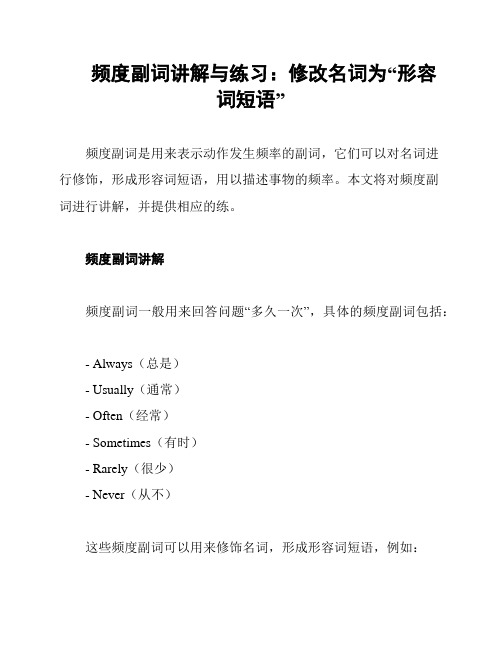
频度副词讲解与练习:修改名词为“形容词短语”频度副词是用来表示动作发生频率的副词,它们可以对名词进行修饰,形成形容词短语,用以描述事物的频率。
本文将对频度副词进行讲解,并提供相应的练。
频度副词讲解频度副词一般用来回答问题“多久一次”,具体的频度副词包括:- Always(总是)- Usually(通常)- Often(经常)- Sometimes(有时)- Rarely(很少)- Never(从不)这些频度副词可以用来修饰名词,形成形容词短语,例如:- An always punctual person(一个总是准时的人)- A usually cheerful smile(一个通常开心的微笑)- An often misunderstood concept(一个经常被误解的概念)- A sometimes challenging task(一个有时具有挑战性的任务)- A rarely seen bird(一种很少见的鸟)- A never-ending story(一个永无止境的故事)练示例任务一将下列名词转化为形容词短语,并写出相应的中文意思。
1. A always busy city(回答:一个总是忙碌的城市)2. A usually crowded restaurant(回答:一个通常拥挤的餐厅)3. An often overlooked detail(回答:一个经常被忽视的细节)任务二造句,使用以下频度副词修饰名词。
- Sometimes- Rarely- Never请回答:1. Use "sometimes" to modify the noun "meeting"2. Use "rarely" to modify the noun "opportunity"3. Use "never" to modify the noun "happening"(回答示例:)1. I attend the team meeting sometimes.2. I have a rarely seen opportunity.3. It's a never-ending happening.以上是频度副词讲解与练的详细内容,希望能对你的研究有所帮助。
频度副词的用法及练习

频度副词用法总结always usually often sometimes hardly ever never 这些都就就是频度副词,一、频度副词得概念与用法频度副词就就是指表示动作发生得次数副词,常见有得never, seldo m, sometimes, frequently,often, usually, always 等。
*频度副词通常位于实义动词之前,动词be、助动词、情态动词等之后。
如:We often get together、我们常常聚会。
Jane usually goes to workby bike、简通常骑自行车上班。
He sometimes goes there on business、她有时到那里出差。
Hecan never understand、她永远也不会明白得。
I shall always remember this、我将永远记住这一点。
注:如果有两个助动词,频度副词通常放在第一个助动词后面。
We h ave never been invited to one of their parties、她们聚会,一次也没邀请过我们。
She must sometimes have wanted to run away、她有时候一定想到过要逃走。
二、频度副词位于助动词之前两种情况1、为了表示强调,频度副词有时也可位于动词be、助动词、情态动词之前;此时助动词等应重读。
如:She always was late、她老就就是迟到。
I never can remember、我永远也记不住。
He never shouldhave joined the army、她根本不应当参军。
2、在简略答语中,当频度副词与动词be、助动词或情态动词位于句末时,频度副词必须前置。
如:“Philip is late again、”“Yes,healwaysis、”菲利普又迟到了。
“就就是得,她总就就是迟到。
频度副词讲解与练习
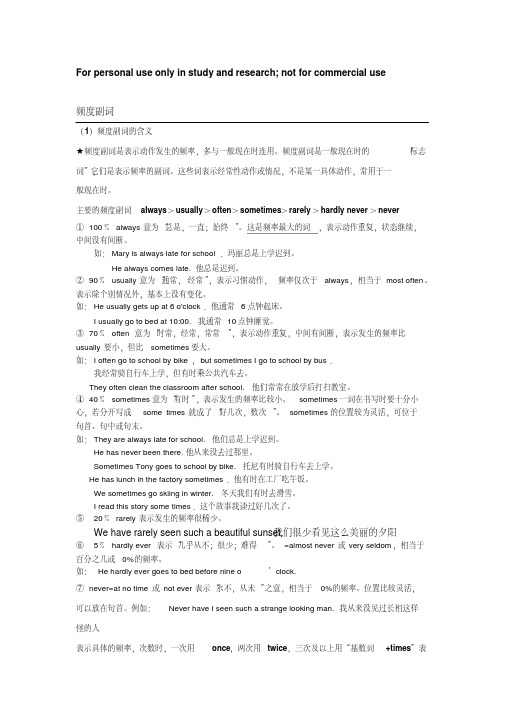
For personal use only in study and research; not for commercial use频度副词(1)频度副词的含义★频度副词是表示动作发生的频率,多与一般现在时连用。
频度副词是一般现在时的“标志它们是表示频率的副词。
这些词表示经常性动作或情况,不是某一具体动作,常用于一词”,般现在时。
主要的频度副词always>usually>often>sometimes>rarely>hardly never>never①100﹪always意为“总是,一直;始终”。
这是频率最大的词,表示动作重复,状态继续,中间没有间断。
如:Mary is always late for school.玛丽总是上学迟到。
He always comes late. 他总是迟到。
②90﹪usually意为“通常,经常”,表示习惯动作,频率仅次于always,相当于most often。
表示除个别情况外,基本上没有变化。
如:He usually gets up at 6 o'clock.他通常6点钟起床。
I usually go to bed at 10:00. 我通常10点钟睡觉。
③70﹪often意为“时常,经常,常常”,表示动作重复,中间有间断,表示发生的频率比usually要小,但比sometimes要大。
如:I often go to school by bike,but sometimes I go to school by bus.我经常骑自行车上学,但有时乘公共汽车去。
They often clean the classroom after school. 他们常常在放学后打扫教室。
④40﹪sometimes意为“有时”,表示发生的频率比较小。
sometimes一词在书写时要十分小心,若分开写成some times就成了“好几次,数次”。
sometimes的位置较为灵活,可位于句首、句中或句末。
四年级英语频度副词运用练习题50题(带答案)
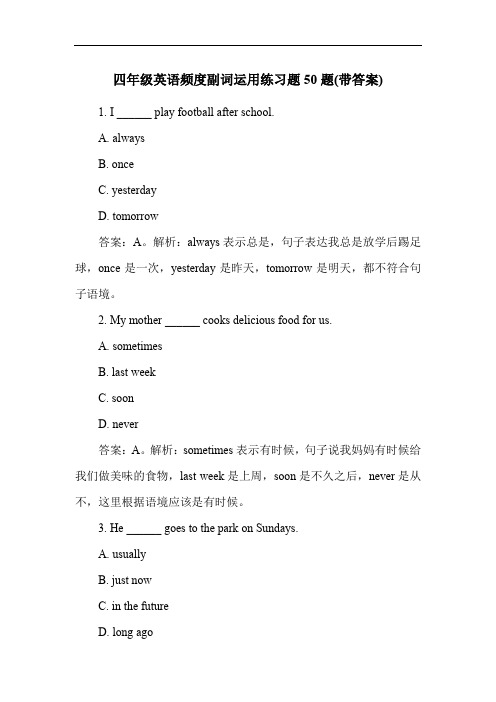
四年级英语频度副词运用练习题50题(带答案)1. I ______ play football after school.A. alwaysB. onceC. yesterdayD. tomorrow答案:A。
解析:always表示总是,句子表达我总是放学后踢足球,once是一次,yesterday是昨天,tomorrow是明天,都不符合句子语境。
2. My mother ______ cooks delicious food for us.A. sometimesB. last weekC. soonD. never答案:A。
解析:sometimes表示有时候,句子说我妈妈有时候给我们做美味的食物,last week是上周,soon是不久之后,never是从不,这里根据语境应该是有时候。
3. He ______ goes to the park on Sundays.A. usuallyB. just nowC. in the futureD. long ago答案:A。
解析:usually表示通常,句子说他通常在周日去公园,just now是刚才,in the future是在将来,long ago是很久以前,都不符合句子意思。
4. We ______ have a party in our classroom.A. seldomB. next monthC. two days agoD. at once答案:A。
解析:seldom表示很少,句子说我们很少在教室开派对,next month是下个月,two days ago是两天前,at once是立刻,这里用seldom合适。
5. She ______ reads books in the library.A. oftenB. a moment agoC. some dayD. by then答案:A。
解析:often表示经常,句子说她经常在图书馆看书,a moment ago是刚才,some day是某一天,by then是到那时,所以选often。
中考英语专题练习-频度副词(含解析)
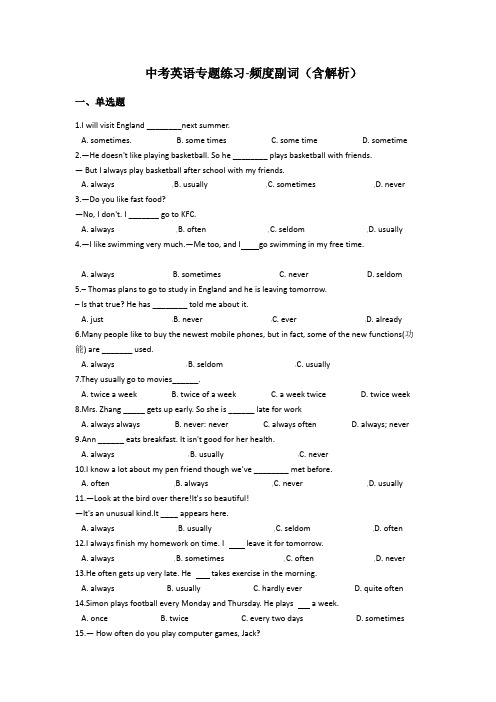
中考英语专题练习-频度副词(含解析)一、单选题1.I will visit England ________next summer.A. sometimes.B. some timesC. some timeD. sometime2.—He doesn't like playing basketball. So he ________ plays basketball with friends.— But I always play basketball after school with my friends.A. alwaysB. usuallyC. sometimesD. never3.—Do you like fast food?—No, I don't. I _______ go to KFC.A. alwaysB. oftenC. seldomD. usually4.—I like swimming very much.—Me too, and I go swimming in my free time.A. alwaysB. sometimesC. neverD. seldom5.– Thomas plans to go to study in England and he is leaving tomorrow.– Is that true? He has ________ told me about it.A. justB. neverC. everD. already6.Many people like to buy the newest mobile phones, but in fact, some of the new functions(功能) are _______ used.A. alwaysB. seldomC. usually7.They usually go to movies______.A. twice a weekB. twice of a weekC. a week twiceD. twice week8.Mrs. Zhang _____ gets up early. So she is ______ late for workA. always alwaysB. never: neverC. always oftenD. always; never9.Ann ______ eats breakfast. It isn't good for her health.A. alwaysB. usuallyC. never10.I know a lot about my pen friend though we've ________ met before.A. oftenB. alwaysC. neverD. usually11.—Look at the bird over there!It's so beautiful!—It's an unusual kind.It ____ appears here.A. alwaysB. usuallyC. seldomD. often12.I always finish my homework on time. I leave it for tomorrow.A. alwaysB. sometimesC. oftenD. never13.He often gets up very late. He takes exercise in the morning.A. alwaysB. usuallyC. hardly everD. quite often14.Simon plays football every Monday and Thursday. He plays a week.A. onceB. twiceC. every two daysD. sometimes15.— How often do you play computer games, Jack?—____ever. I have too much homework to do every day.A. AlwaysB. OftenC. SometimesD. Hardly16.— Do you play computer games?— No, _______. I think they're boring.A. alwaysB. neverC. usuallyD. often17.—Are you ready?—Yes.We can start any time.A. atB. illC. toD. for18.– Bad weather! ________ will the rainy days last?– The radio says it will last for at least 2 weeks.A. How oftenB. How longC. How soonD. How far19.---How often does Lara play the trumpet?--- _____ once or ________ a week, I'm not sure.A. May be, twiceB. Maybe, twiceC. May be, two times20.— How often do you watch news?— ________ .A. I can't stand itB. I like watching it in the eveningC. I watch it every morningD. I think it's very interesting21.—Lily,does your family often make lanterns for Spring Festival?—No, .We really don't know how to make them.A.alwaysuallyC.sometimesD.never22.—He is a man without a sense of responsibility.—We seldom believe him.A. sometimesB. oftenC. rarely23.In CDFLS, we ________begin our English lesson with topics to practice our spoken English.A. neverB. everC. usuallyD. sometimes24.—How often do you take exercise?—.A. sometimesB. Three hoursC. At three o'clockD. In two hours25.Mr. Wang _____ gets up early. So he is ______ late for work.A. always; alwaysB. never; neverC. always; oftenD. always; never26.— ________ is your friend?— He is fourteen.A. WhenB. WhatC. WhereD. How old27.— Is your home close to the school, John?— No, it's a long way, but I am _____ late for school because I get up early every day.A. alwaysB. usuallyC. sometimesD. never28.My parents ___________ go to their hometown. They go there once ten years.A. usuallyB. seldomC. neverD. hardly29.—_____ do you go to the zoo with your sister?—Three times a month.A. How longB. How muchC. How oldD. How often30.Lucy always takes a bus to school. She __ comes to school on foot.A. seldomB. oftenC. sometimesD. never31.Li Lei works in England . He comes to China__.A. three time a yearB. three times a yearC. three times year32.He usually goes to work by bike, but walks to the office.A. oftenB. neverC. alwaysD. sometimes33. —How often do you go skating?—________.I can't skate at all.A. AlwaysB. SometimesC. SeldomD. Never答案解析部分一、单选题1.I will visit England ________next summer.A. sometimes.B. some timesC. some timeD. sometime 【答案】D【考点】频度副词【解析】【分析】句意:明年夏天某时我将要游览英国。
四年级英语频度副词运用练习题50题含答案解析
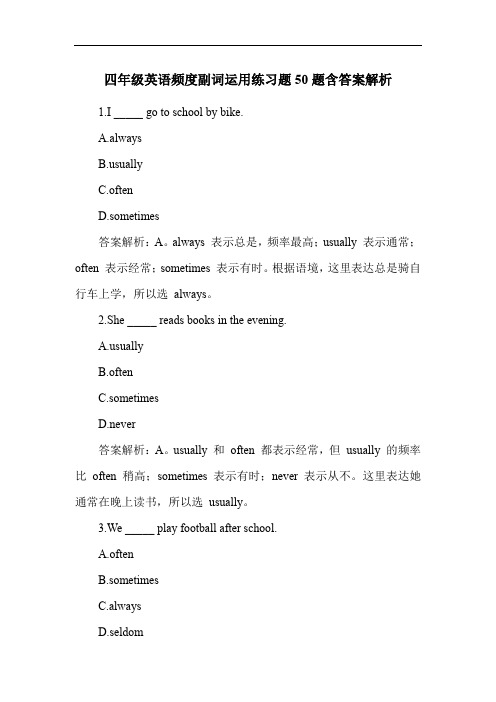
四年级英语频度副词运用练习题50题含答案解析1.I _____ go to school by bike.A.alwaysuallyC.oftenD.sometimes答案解析:A。
always 表示总是,频率最高;usually 表示通常;often 表示经常;sometimes 表示有时。
根据语境,这里表达总是骑自行车上学,所以选always。
2.She _____ reads books in the evening.uallyB.oftenC.sometimesD.never答案解析:A。
usually 和often 都表示经常,但usually 的频率比often 稍高;sometimes 表示有时;never 表示从不。
这里表达她通常在晚上读书,所以选usually。
3.We _____ play football after school.A.oftenB.sometimesC.alwaysD.seldom答案解析:A。
often 表示经常;sometimes 表示有时;always 表示总是;seldom 表示很少。
根据语境,我们经常放学后踢足球,所以选often。
4.My brother _____ watches TV in the morning.A.neverB.sometimesC.oftenually答案解析:A。
never 表示从不;sometimes 表示有时;often 表示经常;usually 表示通常。
早上一般不看电视,所以选never。
5.They _____ go swimming on weekends.A.sometimesB.oftenuallyD.always答案解析:B。
sometimes 表示有时;often 表示经常;usually 表示通常;always 表示总是。
周末去游泳的频率较高但不是总是,所以选often。
6.I _____ eat breakfast at 7:00.uallyB.sometimesC.alwaysD.often答案解析:A。
四年级英语频度副词运用练习题40题(带答案)
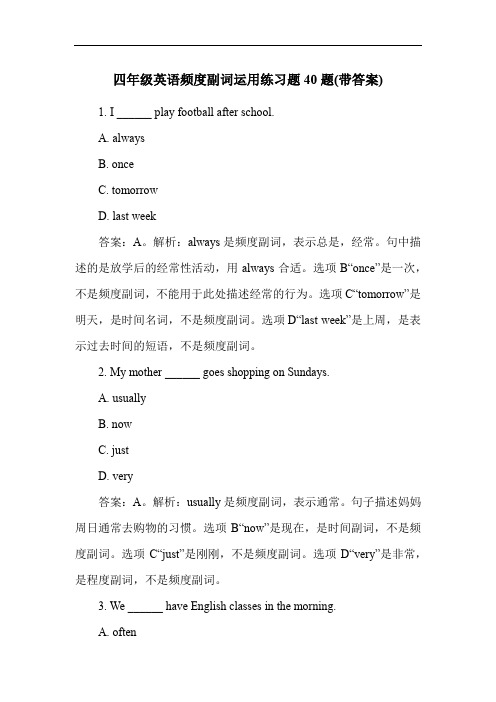
四年级英语频度副词运用练习题40题(带答案)1. I ______ play football after school.A. alwaysB. onceC. tomorrowD. last week答案:A。
解析:always是频度副词,表示总是,经常。
句中描述的是放学后的经常性活动,用always合适。
选项B“once”是一次,不是频度副词,不能用于此处描述经常的行为。
选项C“tomorrow”是明天,是时间名词,不是频度副词。
选项D“last week”是上周,是表示过去时间的短语,不是频度副词。
2. My mother ______ goes shopping on Sundays.A. usuallyB. nowC. justD. very答案:A。
解析:usually是频度副词,表示通常。
句子描述妈妈周日通常去购物的习惯。
选项B“now”是现在,是时间副词,不是频度副词。
选项C“just”是刚刚,不是频度副词。
选项D“very”是非常,是程度副词,不是频度副词。
3. We ______ have English classes in the morning.A. oftenB. oneC. hereD. soon答案:A。
解析:often是频度副词,表示常常。
句子说我们常常在上午有英语课。
选项B“one”是基数词,不是频度副词。
选项C“here”是地点副词,不是频度副词。
选项D“soon”是不久,是时间副词,不是频度副词。
4. He ______ reads books before going to bed.A. sometimesB. everyC. firstD. away答案:A。
解析:sometimes是频度副词,表示有时候。
句子说他有时候在睡觉前看书。
选项B“every”不是频度副词,它常和名词搭配使用,如every day。
选项C“first”是序数词,不是频度副词。
选项D“away”是离开,是副词,但不是频度副词。
频率副词精讲精练(一般现在时专项练习)讲义 (2024年版)外研版英语七年级上册

频率副词精讲精练(一般现在时专项练习)一、副词的概念是指在句子中表示行为或状态特征的词,用以修饰动词、形容词、其他副词或全句,表示时间、地点、程度、方式等概念。
副词可分为:时间副词、频率副词、地点副词、方式副词、程度副词、疑问副词、连接副词、关系副词、表顺序的副词以及表完成的副词。
二、频率副词1.分类(1)表示动作或状态发生频率的副词(又称频度副词)注:often经常被very、quite修饰构成very often、quite often(2)表示具体频率常用到次数(3)e very 系列2.用法(1)位置a.I often get up at six. 放在实义动词之前b.S he is always busy. 放在be动词之后c.t wice、three times、every系列一般放在句尾d.s ometimes可放在句首、句中或者句末,often也可放在句末。
Sometimes she calls me.She calls me sometimes.She calls me often.(2)时态频率副词经常在一般现在时的句子中作状语。
考点:主谓宾结构时,当主语是第三人称单数的时候,后面的动词要加s或es (3)四句型转换a.变否定句:主系表结构:在be动词后面加not主谓宾结构:在动词前加don’t或者doesn’tb.变一般疑问句(必要时,I改成you, we 改成you)主系表结构:be动词提前She is always busy. →Is she always busy? Yes, she is. No, she isn’t.主谓宾结构:在句首加Do或者DoesHe speaks good English. →Does he speak good English? Yes, he does. No, he doesn’t.c.特殊疑问句(对划线部分提问)用How often对频率副词进行提问. 即:做某事的频率I sometimes visit my grandparents.How often do you visit your grandparents?一般现在时专项练习一、单项选择1.Lily doesn’t like swimming. She ________ goes swimming with her father.A.never B.always C.often D. usually2.—How often do you ride a bike with your brother?—________. You know it’s popular these days.A.More than an hour B.At weekends C.Twice a week D.Three times 3.The baby girl couldn’t walk well at first, but now ________ fall down.A.seldom B.always C.often D.sometimes 4.I _________ go shopping in big malls. Online (网上的) shopping is so easy.A.sometimes B.seldom C.usually D.always 5.—You look strong and healthy. ________ do you do sports?—I ________ play football after school every day.A.How much, often B.How long, seldomC.How often, usually D.How soon, sometimes6.She always finishes her homework on time. She ________ leaves it for tomorrow.A.usually B.sometimes C.never7.My friend doesn’t like music and he ________ goes to the concert.A.always B.usually C.never8.We ________ go to the cinema because we are always too busy with our work.A.always B.often C.never9.In England, people ________ use Mr or Mrs before their first names.A.never B.often C.always D.sometimes 10.Lucy ________ like watching movies, and she ________ goes to the cinema.A.doesn’t; often B.don’t; often C.doesn’t; never D.don’t; never 11.Lucy is afraid of dogs, so she ________ wants to have a dog.A.always B.usually C.sometimes D.never12.Mike is a good student. He ________ comes to school early. He is ________ late for school.A.often; always B.always; never C.never; sometimes D.sometimes; usually 13.Jane’s mother doesn’t like cooking. She ________ cooks at home.A.always B.usually C.often D.never14.—Why do you go to the swimming pool, Tom?—Well, it is too far from my home.A.always B.seldom C.usually D hardly15.My parents don’t like music and they _________ go to the concert.A.often B.usually C.sometimes D.never16.一______do you often eat dinner?一At 6: 30 p. m.A.Why B.What C.What time D.Where17.— ______ does your friend exercise? — On weekends.A.What time B.What C.When D.Where18.—________ does your father go to bed?—He usually goes to bed at ten o’clock.A.What time B.Where C.How D.Why19.—_________ do you go to see your grandparents?—On Saturday morning.A.How B.When C.Where D.Who20.He usually _________ his teeth _________ half past seven.A.brush; on B.brushes; on C.brush; at D.brushes; at21.He usually _________ home _________ work.A.go; before B.goes; when C.goes; after D.go; after22.Either Jim or Bob_________ computer games after lunch.A.play B.plays C.playing D.to play 23.—How often do you go to the cinema?—________. I only watch movies at home.A.Always B.Usually C.Sometimes D.Never 24.— _________ do you have lunch?—At about 12:00.A.What B.Where C.How D.What time 25.Tom ________ his room every day, so his room is very ________.A.clean; clean B.cleans; cleans C.clean; cleans D.cleans; clean 二、完成句子1~5 ACABC6~10 CCCAC11~15 DBDDD16~20 CCABD21~25 CBDDD26 twice27 often; Never28 never; plays29 What time does; go30 usually have lunch31 when do; go32 What time does he usually take a shower?33 He is never late for work.34 How often; get up; At six35 When does; take36 don’t do37 What time; get up38 What time39 What do40 doesn’t get41 What time42 When; exercise43 twice44 once45 always46 never47 doesn’t do48 brushes49 usually50 dresses51 works52 tells。
(完整word版)几个频率副词的用法知识点及练习题,推荐文档
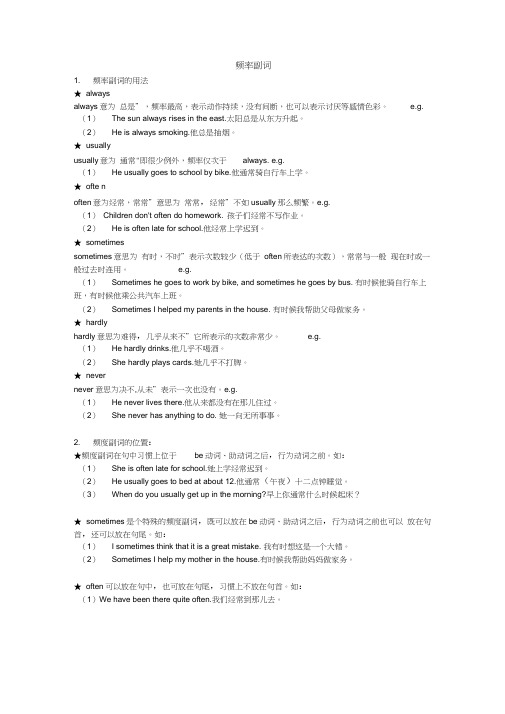
频率副词1. 频率副词的用法★alwaysalways意为总是”,频率最高,表示动作持续,没有间断,也可以表示讨厌等感情色彩。
e.g.(1)The sun always rises in the east.太阳总是从东方升起。
(2)He is always smoking.他总是抽烟。
★usuallyusually意为通常"即很少例外,频率仅次于always. e.g.(1)He usually goes to school by bike.他通常骑自行车上学。
★ofte noften意为经常,常常”意思为常常,经常”不如usually那么频繁。
e.g.(1)Children don't often do homework. 孩子们经常不写作业。
(2)He is often late for school.他经常上学迟到。
★sometimessometimes意思为有时,不时”表示次数较少(低于often所表达的次数),常常与一般现在时或一般过去时连用。
e.g.(1)Sometimes he goes to work by bike, and sometimes he goes by bus. 有时候他骑自行车上班,有时候他乘公共汽车上班。
(2)Sometimes I helped my parents in the house. 有时候我帮助父母做家务。
★hardlyhardly意思为难得,几乎从来不”它所表示的次数非常少。
e.g.(1)He hardly drinks.他几乎不喝酒。
(2)She hardly plays cards.她几乎不打牌。
★nevernever意思为决不,从未”表示一次也没有。
e.g.(1)He never lives there.他从来都没有在那儿住过。
(2)She never has anything to do. 她一向无所事事。
2. 频度副词的位置:★频度副词在句中习惯上位于be动词、助动词之后,行为动词之前。
七年级英语频度副词讲解及练习

感谢观看
汇报人:XX
表示“另外”的副词辨析,如in addition, besides等
频度副词与时间连用的特殊情况
有些情况下,频度副词可以与 时间连用,表示某个动作发生 的频率
频度副词与时间连用时,需要 注意时态和语态的正确使用
频度副词与时间连用时,通 常放在句子的中间位置
频度副词与时间连用时,需 要注意语境和表达的准确性
添加章节标题
Part Two
频度副词的概念和分类
频度副词的定义
频度副词是用来表示动作发生的频率的副词,如“always”、“often”、 “sometimes”、“never”等。
频度副词通常放在动词之前,有时也会放在系动词之后。
频度副词可以用来修饰动词、形容词、副词或整个句子。
频度副词在句子中表示动作或状态发生的频率和次数。
频度副词有时可以放在句首, 但通常是ቤተ መጻሕፍቲ ባይዱ强调时才这样做。
在否定句中,频度副词通常放 在助动词之后,实义动词之前。
频度副词可以放在倒装句中, 但需要注意语序的调整。
Part Four
频度副词的练习
选择合适的频度副词填空
每天早上,我都会去跑步。( ) 我通常在周末去购物。( ) 她从不迟到。( ) 我们偶尔会去电影院看电影。( )
频度副词位置不当引起的语法错误
频度副词的位置应放在be动词、 情态动词之后,实义动词之前
常见错误:将频度副词放在句 首或句末,导致句子结构不完 整或语法错误
正确示例:I often go to the park on weekends. (频度副 词放在实义动词前)
错误示例:I am often go to the park on weekends. (频 度副词放在be动词之后)
频率副词讲解与练习
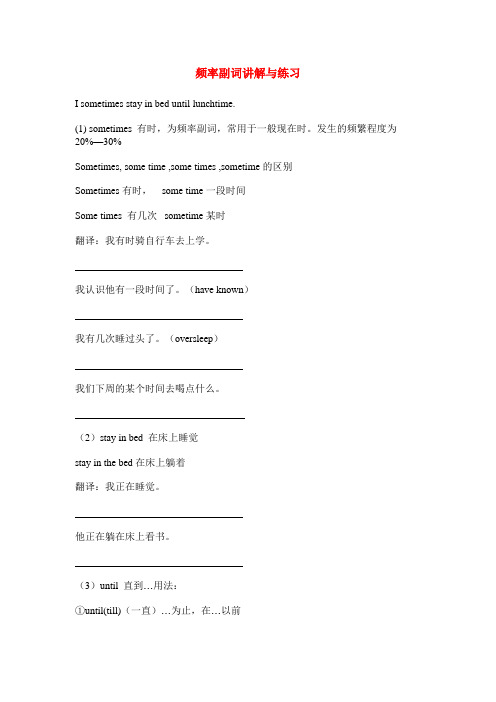
频率副词讲解与练习I sometimes stay in bed until lunchtime.(1) sometimes 有时,为频率副词,常用于一般现在时。
发生的频繁程度为20%—30%Sometimes, some time ,some times ,sometime的区别Sometimes有时,some time一段时间Some times 有几次sometime某时翻译:我有时骑自行车去上学。
我认识他有一段时间了。
(have known)我有几次睡过头了。
(oversleep)我们下周的某个时间去喝点什么。
(2)stay in bed 在床上睡觉stay in the bed在床上躺着翻译:我正在睡觉。
他正在躺在床上看书。
(3)until 直到…用法:①until(till)(一直)…为止,在…以前翻译:我一直等到三点钟,但他没来。
②(用于否定句)到…为止,直到…才翻译:直到午夜,大街上的噪音才停止。
(midnight, noise)选择She worked from eight ____ twelve.A byB atC onD till(4)lunchtime午饭时间,这是一个合成词,不能分开写。
Policeman ,iceland. 翻译:早餐时间晚餐时间他在我们午饭时间出去了。
I never get up early on Sunday讲解与练习I never get up early on Sunday.(1)① never不;永不。
表示否定含义。
翻译:他从不和别人打仗。
(fight against with others)她从不玩火。
(play with fire)经常考never在反意疑问句中的用法。
选择:He never go to school on time,___ ___?A doesn’t heB do heC does heD don’t he②never, sometimes, always是课文里出现的比较多的频度副词。
完整版)频度副词练习及中考题
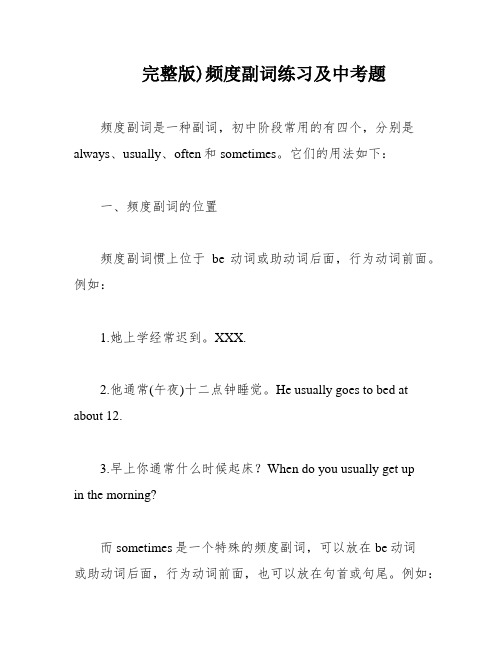
完整版)频度副词练习及中考题频度副词是一种副词,初中阶段常用的有四个,分别是always、usually、often和sometimes。
它们的用法如下:一、频度副词的位置频度副词惯上位于be动词或助动词后面,行为动词前面。
例如:1.她上学经常迟到。
XXX.2.他通常(午夜)十二点钟睡觉。
He usually goes to bed at about 12.3.早上你通常什么时候起床?When do you usually get upin the morning?而sometimes是一个特殊的频度副词,可以放在be动词或助动词后面,行为动词前面,也可以放在句首或句尾。
例如:1.我有时想这是一个大错。
I sometimes think that it is a great mistake.2.有时候我帮助妈妈做家务。
XXX.often可以放在句中或句尾,但惯上不放在句首。
例如:我们经常到那儿去。
We have been there quite often.这些频度副词的位置与句中谓语动词有无助动词有关。
句中没有助动词时,副词置于动词be之后,其它动词之前。
二、表示频度方面的区别always是频度最大的词,意为“总是;永远”。
例如:我将永远记住我上学的第一天。
I shall always remember my first day at school.usually意为“通常”,即很少例外,频度仅次于always。
例如:你通常早餐吃什么?What do you usually have for breakfast?often意为“经常”,在频度上不如usually那么频繁。
例如:XXX经常在下午做作业。
Li Ping often does his XXX.sometimes意为“有时候”,频度比often小,表示动作偶尔发生,间断较大。
例如:我有时去图书馆。
I sometimes go to the library.我有时在晚上看书。
频度副词的用法及练习

频度副词用法总结always usually often sometimes hardly ever never 这些都是频度副词,一、频度副词的概念与用法频度副词是指表示动作发生的次数副词,常见有的never, seldom, sometimes, frequently, often, usually, always 等。
*频度副词通常位于实义动词之前,动词be、助动词、情态动词等之后。
如:We often get together. 我们常常聚会。
Jane usually goes to work by bike. 简通常骑自行车上班。
He sometimes goes there on business. 他有时到那里出差。
He can never understand. 他永远也不会明白的。
I shall always remember this. 我将永远记住这一点。
注:如果有两个助动词,频度副词通常放在第一个助动词后面。
We have never been invited to one of their parties. 他们聚会,一次也没邀请过我们。
She must sometimes have wanted to run away. 她有时候一定想到过要逃走。
二、频度副词位于助动词之前两种情况1. 为了表示强调,频度副词有时也可位于动词be、助动词、情态动词之前;此时助动词等应重读。
如:She always was late. 她老是迟到。
I never can remember. 我永远也记不住。
He never should have joined the army. 他根本不应当参军。
2. 在简略答语中,当频度副词与动词be、助动词或情态动词位于句末时,频度副词必须前置。
如:“Philip is late again.”“Yes, he always is.”菲利普又迟到了。
频度副词讲解与练习
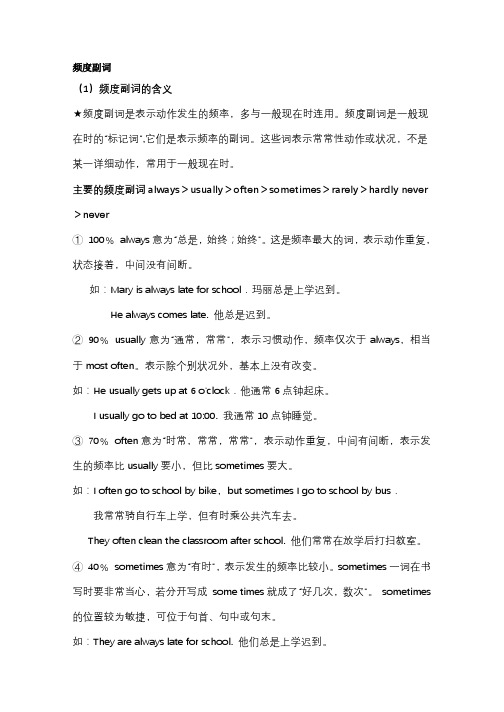
频度副词(1)频度副词的含义★频度副词是表示动作发生的频率,多与一般现在时连用。
频度副词是一般现在时的“标记词”,它们是表示频率的副词。
这些词表示常常性动作或状况,不是某一详细动作,常用于一般现在时。
主要的频度副词always>usually>often>sometimes>rarely>hardly never >never①100﹪always意为“总是,始终;始终”。
这是频率最大的词,表示动作重复,状态接着,中间没有间断。
如:Mary is always late for school.玛丽总是上学迟到。
He always comes late. 他总是迟到。
②90﹪usually意为“通常,常常”,表示习惯动作,频率仅次于always,相当于most often。
表示除个别状况外,基本上没有改变。
如:He usually gets up at 6 o'clock.他通常6点钟起床。
I usually go to bed at 10:00. 我通常10点钟睡觉。
③70﹪often意为“时常,常常,常常”,表示动作重复,中间有间断,表示发生的频率比usually要小,但比sometimes要大。
如:I often go to school by bike,but sometimes I go to school by bus.我常常骑自行车上学,但有时乘公共汽车去。
They often clean the classroom after school. 他们常常在放学后打扫教室。
④40﹪sometimes意为“有时”,表示发生的频率比较小。
sometimes一词在书写时要非常当心,若分开写成some times就成了“好几次,数次”。
sometimes 的位置较为敏捷,可位于句首、句中或句末。
如:They are always late for school. 他们总是上学迟到。
He has never been there. 他从来没去过那里。
频度副词地用法及练习
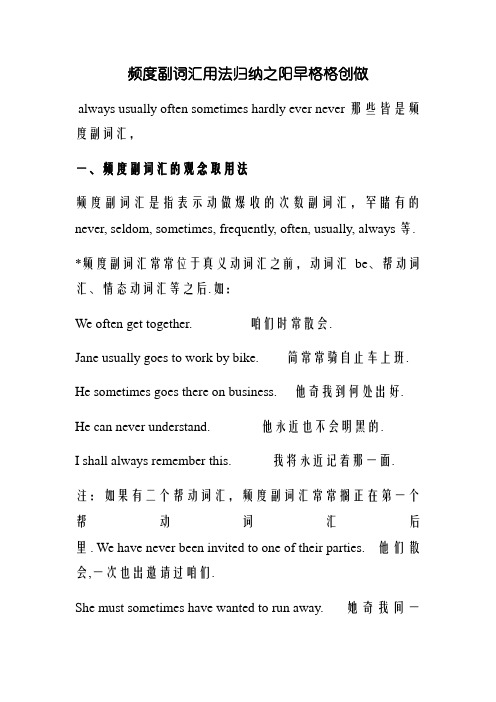
频度副词汇用法归纳之阳早格格创做always usually often sometimes hardly ever never 那些皆是频度副词汇,一、频度副词汇的观念取用法频度副词汇是指表示动做爆收的次数副词汇,罕睹有的never, seldom, sometimes, frequently, often, usually, always 等. *频度副词汇常常位于真义动词汇之前,动词汇be、帮动词汇、情态动词汇等之后.如:We often get together. 咱们时常散会.Jane usually goes to work by bike. 简常常骑自止车上班. He sometimes goes there on business. 他奇我到何处出好. He can never understand. 他永近也不会明黑的.I shall always remember this. 我将永近记着那一面. 注:如果有二个帮动词汇,频度副词汇常常搁正在第一个帮动词汇后里. We have never been invited to one of their parties. 他们散会,一次也出邀请过咱们.She must sometimes have wanted to run away. 她奇我间一定料到过要遁走.二、频度副词汇位于帮动词汇之前二种情况1. 为了表示强调,频度副词汇奇我也可位于动词汇be、帮动词汇、情态动词汇之前;此时帮动词汇等应重读.如:She always was late. 她老是早退.I never can remember. 我永近也记不住.He never should have joined the army. 他根原不该当从军.2. 正在大略问语中,当频度副词汇取动词汇be、帮动词汇或者情态动词汇位于句终时,频度副词汇必须前置.如:“Philip is late again.”“Yes, he always is.”菲利普又早退了.“是的,他经常早退.”“Can you park your car near the shops?”“Yes. I usually can .”“您不妨正在商店附近停车吗?”“是的,常常不妨.”I know I should take exercise, but I never do.我知讲我该当举止体育锻炼,但是我从去出那样搞过.三、频度副词汇正在可定句中的用法正在可定句中,有的频度副词汇位于可定词汇之前或者之后均可,而有的频度副词汇则必须位于可定词汇之后,而另有的频度副词汇却必须要位于可定词汇.大概情况如下:1.频度副词汇usually战often可位于可定词汇not之前或者之后.2.频度副词汇always经常位于可定词汇之后,不可位于可定句之前.如:Things are not always what they seem to be. 中表往往是靠不住的.Silence must not always be read as consent. 重默本去不睹得一定表示着共意.3. 频度副词汇sometimes经常位于可定词汇之前,不可位于可定词汇之后.如:Jim is sometimes not very punctual.凶姆奇我不太准时.Debbie is sometimes not responsible for what she does.戴比奇我对于她所搞的事不控制任.三、频度副词汇取not连用时,表示部分可定;对于频度副词汇举止提问时,要用how often.如:go to the cinema sometimes.(对于划线部分提问)问: How often do you go to the cinema?四、频度副词汇位于句终的用法1.sometimes常可用于句终. 如:We all get into trouble sometimes. 咱们奇我皆市逢到贫苦.You can’t work all the time—it does you good to go out and enjoy yourself sometimes.您不克不迭经常处事,奇我进去搁紧一下会对于您有佳处.2. often奇我可置于句终,但是常常会戴有very, quite, fairly, more, so等建饰语.如: We’ve been there quite often. 时常去何处.When I was young, I used to play tennis very often. 我年少时时常挨网球.Diana used to travel a lot. These days she doesn’t go away so often. 戴安娜往日时常旅游.迩去她不常出门了.Weare not exactly on intimate terms, but we see each other fairl y often. 咱们虽算不上闭系稀切,但是还罕睹里.注:奇我也可不戴建饰语,但是主要睹于可定句或者疑问句. 如:He writes to me often. 他时常给我写疑.Do you come here often? 您常去那女吗?I don’t come here often. 我不常去那女.3. usually奇我也用于句终,其前不必建饰语. 如:I’m not late, usually.我常常不早退.I get paid on Fridays usually.我常常正在星期五收人为.4. seldom 普遍不必于句终,除非其前戴有only, very等建饰.如:We go out very seldom.咱们绝少出门.I play basketball very seldom indeed.我很少挨篮球.5. always普遍不必于句终,奇我用于句终,此时它不表法“经常”,而表示“永近”如:I’ll love you always.我将永近爱您.其余,奇我用于句终是果为句子有所大略的去由. 如:Generally they walked together on Sunday, but not always.他们普遍正在星期日所有集步,但是本去不经常如许.句中的but not always=but they didn’t always walk together on Sunday五、频度副词汇位于句尾的用法1. sometimes常可用于句尾.如:Sometimes she comes late.奇我她去得早.Sometimes she didn’t agree with me.奇我她战我意睹纷歧致.Sometimes we get a lot of rain in August.奇我正在8月份雨火很大.2. often用于句尾时,常常表示强调,且其前普遍有quite, very建饰.如:Very often he comes in late.他时常早退.Quite often the phone rings when I’m in the bath.电话时常正在我洗澡时响.3. usually奇我也用于句尾,其前不必建饰语.如:Usually I get up early.我通常起得早.Sometimes he comes by bus, but usually he comes by taxi.奇我他坐大众汽车去,不过他常常仍旧挨的去.Usually cooking pots have two small handles but pans have one long handle.常常天深底煮锅有二只把脚而仄底锅惟有一个少少的把脚.4. always普遍不必于句尾,除非是用正在祈使句中. 如:Always remember this.请时刻记着那一面.Always look in the mirror before starting to drive.一定要先瞅瞅反光镜再启车.其余,never也可用于祈使句的句尾.如:Never tell him the news.千万不要报告他那消息.Never ask her about her marriage.决不要问她完婚的事5. 正在正式文体中,表示可定意思的副词汇seldom, never 可位于句尾,但是此时其后要用倒拆语序.如:Seldom has there been such a happy meeting.往日很罕见过那样舒畅的散会.Never did he think the book would be finished so soon.他可出料到那原书籍会那样快瞅完*always, usually, often, sometimes的用法战辨别always,usually,often,sometimes, seldom战never皆是用去表示时间的频度副词汇,但是它们所表示的动做频次分歧.常常道去,always表示100%,usually表示80%,often表示60%,sometimes表示40%,seldom表示20%,never表示0%.1. always是频度最下的词汇,表示动做的重复,状态的继承,中间不间断. 意为“经常、向去”,其反义词汇是never.当它取当前举止时连用时,常译做“老是”,“经常”,戴有赞扬、厌烦、不谦等感情色彩.▲ The sun always rises in the east and sets in the west. 太阳向去东降西降.▲ She is always coming late. 她老是早退.2. usually意为“常常”,表示常常如许,很少例中,频度仅次于always,反义词汇为unusually.▲ What do you usually do on Sundays? 您星期天常常搞什么?▲ I usually got up at six in the morning last term. 上教期我常常正在早上六面钟起床.3. often意为“时常、时常”,不如usually那么一再,表示动做重复,中间有间断,反义词汇为seldom.▲ They often go for a walk after supper. 早饭后他们时常去集步.▲ My parents often take me to the zoo on weekends. 我女母时常正在周终戴我去动物园.4. sometimes意为“奇我、不时”,表示动做奇我爆收,中间常有间断,频次比often矮.▲ Sometimes they play football on Saturday afternoon. =They sometimes play football on Saturday afternoon. =They play foot ball on Saturday afternoon sometimes. 他们奇我正在星期六下午踢脚球.5. seldom意为“很少;不常”,频度较矮.▲ We seldom go to school bus. We usually go there by bike. 咱们很少乘车去上教,咱们常常是骑车去.▲ He seldom has lunch at home. 他很少正在家吃午饭.6. never意为“从去不、已曾”,频度为整.▲ We can say Mr. John Brown or Mr. Brown, but we can never say Mr. John. 咱们不妨道Mr. John Brown或者Mr. Brown,但是从去不克不迭道Mr. John.▲ The twins have never been to the Great Wall. 那对于单胞胎从不去过少乡.注意:普遍情况下,那五个词汇皆位于止为动词汇之前,be动词汇、帮动词汇或者情态动词汇之后. sometimes的位子较机动,不妨搁正在句中,也不妨搁正在句尾或者句终.。
- 1、下载文档前请自行甄别文档内容的完整性,平台不提供额外的编辑、内容补充、找答案等附加服务。
- 2、"仅部分预览"的文档,不可在线预览部分如存在完整性等问题,可反馈申请退款(可完整预览的文档不适用该条件!)。
- 3、如文档侵犯您的权益,请联系客服反馈,我们会尽快为您处理(人工客服工作时间:9:00-18:30)。
频度副词(1)频度副词的含义★频度副词是表示动作发生的频率,多与一般现在时连用。
频度副词是一般现在时的“标志词”,它们是表示频率的副词。
这些词表示经常性动作或情况,不是某一具体动作,常用于一般现在时。
主要的频度副词always>usually>often>sometimes>rarely>hardly never>never① 100﹪ always意为“总是,一直;始终”。
这是频率最大的词,表示动作重复,状态继续,中间没有间断。
如:Mary is always late for school.玛丽总是上学迟到。
He always comes late. 他总是迟到。
② 90﹪ usually意为“通常,经常”,表示习惯动作,频率仅次于always,相当于most often。
表示除个别情况外,基本上没有变化。
如:He usually gets up at 6 o'clock.他通常6点钟起床。
I usually go to bed at 10:00. 我通常10点钟睡觉。
③ 70﹪ often意为“时常,经常,常常”,表示动作重复,中间有间断,表示发生的频率比usually要小,但比sometimes要大。
如:I often go to school by bike,but sometimes I go to school by bus.我经常骑自行车上学,但有时乘公共汽车去。
They often clean the classroom after school. 他们常常在放学后打扫教室。
④ 40﹪ sometimes意为“有时”,表示发生的频率比较小。
sometimes一词在书写时要十分小心,若分开写成 some times就成了“好几次,数次”。
sometimes的位置较为灵活,可位于句首、句中或句末。
如:They are always late for school. 他们总是上学迟到。
He has never been there. 他从来没去过那里。
Sometimes Tony goes to school by bike. 托尼有时骑自行车去上学。
He has lunch in the factory sometimes.他有时在工厂吃午饭。
We sometimes go skiing in winter. 冬天我们有时去滑雪。
I read this story some times.这个故事我读过好几次了。
⑤ 20﹪ rarely表示发生的频率很稀少。
We have rarely seen such a beautiful sunset.我们很少看见这么美丽的夕阳⑥ 5﹪ hardly ever 表示“几乎从不;很少;难得”。
=almost never或very seldom,相当于百分之几或0%的频率。
如: He hardly ever goes to bed before nine o’clock.⑦ never=at no time或not ever表示“永不,从未”之意,相当于0%的频率。
位置比较灵活,可以放在句首。
例如: Never have I seen such a strange looking man. 我从来没见过长相这样怪的人表示具体的频率,次数时,一次用once,两次用twice,三次及以上用“基数词+times”表示I play soccer twice a week.She watches TV for times a week.【跟踪练习】1.写出频度副词1.总是,一直()2.通常()3.经常()4.有时()5.几乎不()6.从不()2.选择题1. He ____ goes to bed too late, because he has to get up early every day.A. alwaysB. neverC. usuallyD. sometimes2. She always finishes her homework on time. She ____ leaves it for tomorrow.A. alwaysB. neverC. usuallyD. sometimes3.—I didn’t know you take a bus to school.—Oh, I ______ take a bus, but it is snowing today.A. hardlyB. neverC. sometimesD. usually4. How often do you go to a concert_______ ever. I’m not interested in that at all.A. UsuallyB. HardlyC. Almost(2)频度副词的位置①频度副词一般放在实义动词之前,be动词、助动词或情态动词之后We never eat junk(垃圾) food.Lucy is sometimes very busy.I can hardly say a word.②sometimes是个特殊的频度副词,既可以放在be动词、助动词之后,行为动词之前,也可以放在句首,还可以放在句尾。
如:I sometimes think that it is a great mistake.我有时想这是一个大错。
Sometimes I help my mother in the house.有时候我帮助妈妈做家务。
③often可以放在句中,也可放在句尾We have been there quite often.我们经常到那儿去。
often用于句首时通常表示强调,且其前面一般有quiet,very修饰Very often he goes online. 他上网很经常④usually有时也放于句首,其前不用修饰语Usually my father gets up early. 我爸爸经常起床很早⑤always一般不用于句首,但是在祈使句中可以Always remember this. 请时刻记住这点【随堂练习】一.把句子填写完整1. You forgot to do your homework. (rarely) 你几乎忘记了做你的作业。
2. He gets up at 6 o’clock every morning.(never)他每天早晨从来不在六点钟起床。
3. We have seen such a beautiful sunset. (rarely)我们很少看到如此美丽的日落。
4. She is on time.( never) 她从来不守时。
5. Your grandparents go out for a walk. (hardly)你的爷爷奶奶几乎不出去散步。
6. The sun rises in the west. (never) 太阳从来不在西边升起。
(3)对频度副词的提问对频率副词提问通常用how often这一短语,意为“多久一次”。
例子1 Li Ming usually does his homework after supper. (对划线部分提问) How often does Li Ming do his homework after supper例子2 We go to the cinema sometimes.(对划线部分提问)How often do you go to the cinema【综合测试】一,选择题1.—How often does your sister surf the Internet—About( .)A. three timeB. three timesC. three time every dayD. three times a day2.—()does it take you to watch TV—About forty minutes.A. How longB. How muchC. How oftenD. How many3.—Were you often late for school last term, Tom—No, _______. I got to school early every day.A. AlwaysB. UsuallyC. SometimesD. Never4.—John sings so well. Has he ever been trained—No. He learns all by himself. He ________ goes to any training class.A. usuallyB. oftenC. neverD. even5.—Miss Gao is very popular with her students.—Yes. Her classes are ______ lively and interesting.A. seldomB. neverC. sometimesD. always6.—_____do you go to the bookstore—Once a month.A. How oftenB. How many timesC. How manyD. How long7.—Oh, my God! I can ______ put on my trousers.—You must be getting fat.A. oftenB. hardlyC. sometimesD. quietly二、翻译1.大多数学生每周锻炼三四次。
Most students exercise ____ _____ _____ _____ _____ _____.2.他一周回家三次。
He goes home ______ _______a week.。
